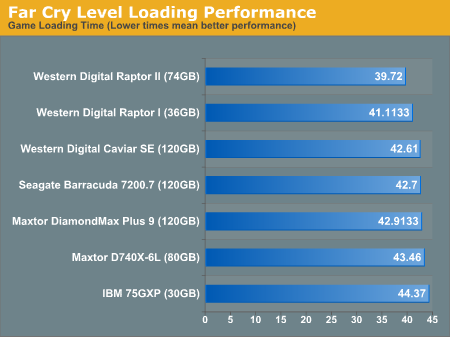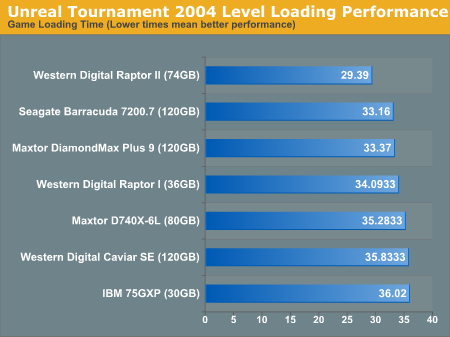Q2 2004 Desktop Hard Drive Comparison: WD Raptor vs the World
by Anand Lal Shimpi on June 7, 2004 12:05 AM EST- Posted in
- Storage
Game Loading Performance
One test that everyone wants to see when it comes to hard disk reviews is something game-related. For the most part, gamers agree that your hard drive isn't limiting performance while you're actually playing a game. After all, if you are swapping to disk a lot, then your gaming experience is going to be pretty poor, regardless of how fast your disk is. But what is important and very noticeable when it comes to disk performance in games are loading times.
Today's games have arguably some of the worst loading times ever, thanks to extremely large artwork, levels and other game data that must be loaded before game play can begin. Games also provide a very tangible and perceivable platform for hard disk performance comparison; while even Winstone scores may be difficult to relate to, everyone knows what waiting longer feels like.
For our game loading tests, we used two games: Far Cry and Unreal Tournament 2004. Both games were installed, in full, to the hard drive. We then used no-CD patches to prevent any accessing of the CD/DVD drive to skew the loading process. Both games were installed to a clean drive without anything else present on the drive (the OS is located on a separate drive).
Our Far Cry test consists of starting a campaign with the default difficulty level, hitting escape to skip the introductory movie and beginning the stop watch timer at first sight of the loading screen. The stop watch timer is stopped as soon as the loading screen disappears. The test is repeated three times with the final score reported being an average of the three. In order to avoid the effects of caching, we reboot between runs. All times are reported in seconds, lower scores obviously being better.

The benefits of a 10,000RPM spindle speed are not much when just looking at the first generation Raptor, but the new Raptor manages to offer a 6% performance advantage even over the current generation 7200RPM 8MB cache drives.
Our Unreal Tournament 2004 test uses the full version of the game and leaves all settings on defaults. After launching the game, we select Instant Action from the menu, choose Assault mode and select the Robot Factory level. The stop watch timer is started right after the Play button is clicked, and stopped when the loading screen disappears. The test is repeated three times with the final score reported being an average of the three. In order to avoid the effects of caching, we reboot between runs. All times are reported in seconds, lower scores obviously being better.

The UT test shows similar standings (although there is a bit of swapping amongst the 7200RPM 8MB cache contenders), but the 2nd generation Raptor extends its lead over its predecessor significantly. The first generation Raptor is even slightly outpaced by Seagate's 7200.7 series.










50 Comments
View All Comments
Athlonite - Saturday, March 24, 2007 - link
both raptor drives are SATA and all the other drives are Pata i know for a fact the seagate baracuda 7200.7 comes in a sata II form coz i have two of them in raid 0 i'd pit the against your single raptor any day of the week as i said like comaring apples with peaspeufeu - Monday, May 9, 2005 - link
Stop benchmarking copies of 1 MB files !Linux, with reiserfs4 :
My crap laptop harddrive does about 16 MB/second raw bandwidth. It does 15 MB/second reading 20 KBytes files. Not that bad.
I'd like to see the raptor benchmarked with reiser4. I'm pretty sure it can sustain at least 80% of its peak bandwidth with 1kbyte files...
jferdina - Sunday, August 22, 2004 - link
here is a link:http://www.buildsilentpc.com/forum/viewtopic.php?t...
jferdina - Sunday, August 22, 2004 - link
I want to WARN you all of Seagate Barracuda 7200.7I just bought one for 1 day and I am terribly disappointed.
Unlike the seagate barracuda 7200.7 that was tested by AnandTech, the newer version is EXTREMELY noisy. It is the most noisiest HD that I have ever had.
The reason is Seagate got into a lawsuit problem with Convolve. Apparently Seagate steals their technology, and at least for now they have to remove it. The technology is 'Automatic Acoustic Management' (AAM).
But for those of you who are tricked, like me, there is some information that may give a hope, AAM is still there but they set it in "performance" mode by default on current firmware. But hardware.fr claimed they had firmware 3.16 and could change the setting.
So MAYBE IF they can settle the lawsuit, Seagate would provide firmware upgrade to solve this problem.
Anandtech, please change your review about Seagate since the information is already old because it is very frustrating for customers that wishes to find an accurate info, gets the completely opposite result from what informed.
Fietsventje - Wednesday, June 16, 2004 - link
I didn't read all of the comments, but I would like to say that I, like some others here, would like to see what impact a RAID0-array has on these benchmarks. Could finally resolve the ever-lasting discussion (at least, for myself) about the influence of a RAID-0-setup to general performance.Greetz,
Fietsventje
skyce - Monday, June 14, 2004 - link
I would really like to see a comparison of one 74GB SATA Raptor 10k to two new Raptors in Raid0. I'm building a system over the next couple months and would like to have this drive in my system, but am somewhat reluctant to fork over another $200 for a second drive for Raid0, as Wesley suggested in his High End System Guide (May 26th).HelzBelz - Monday, June 14, 2004 - link
... and also, it just so happens that I've just received the exact same hardware (see previous post), but for 2 different systems (upgrades for other people).
i.e. 2x 80GB ATA WD 8Meg w/ Highpoint 370 PCI RAID Card, and one 74GB SATA Raptor 10k...
Perhaps we could then compare results !?
Regards,
HelzBelz
HelzBelz - Monday, June 14, 2004 - link
Perhaps this has already been suggested, but here it goes:
- What about a RAID0 test of some pair of less expensive drives VS a Single Raptor ?
i.e. For "about the same money", I've often been asked: "Which of the abobe is better / faster ?"
For example, one could compare the performance of a "2x WD 80GB 8MB cache RAID0" setup, versus a Single 74GB Raptor 10k drive; since either way, you're paying about the same total price...
Just a thought,
HelzBelz
artifex - Sunday, June 13, 2004 - link
I'd like to get a MTBF comparison, not just some data on warranties, too. Or better yet, it would be cool for Anandtech to actually set up a system to run the test drives continuously until they start failing.Why? Our local Fry's often has drives like the PATA version of a Hitachi 200GB on sale for $50 after rebates, but if they burn up or crash in half the time as a $100 drive, I'd much rather get the $100 drive. This is particularly important for applications like adding drives to PVRs, where it's not easy to remap around known bad sectors after they're found, and at least one manufacturer's low level formatting utility won't work with Nforce-based IDE, so remapping at the lower level is out also.
I'm also hoping for thermal comparisons; in small form factor enclosures this is just as important as noise.
MadAd - Saturday, June 12, 2004 - link
IMO you are missing a very important 'real world' test that has always interested me on machines through years.Test: Tester starts stopwatch as power button us pressed. Tester stops stopwatch at the point that the desktop appears ready for use...... Record Time Taken. Thats it!
The funny thing is youve probably not realised how much you run this 'test' and its a valid one insofar as everyone needs to boot up at some point - just please, do us a favor, time it and chart it? :)
Thanks